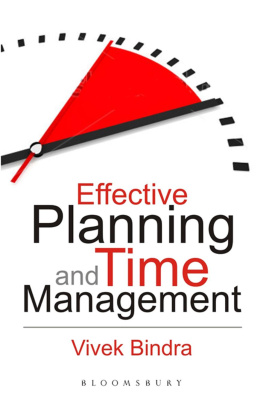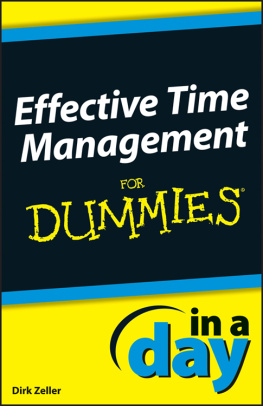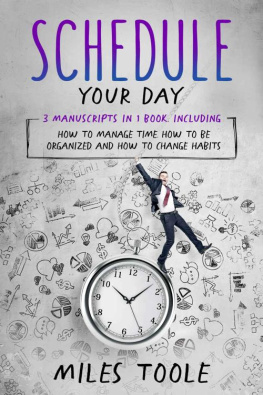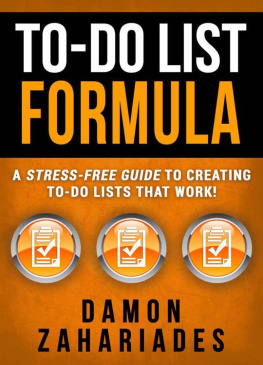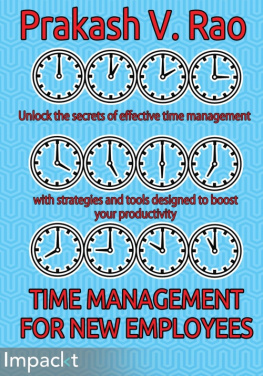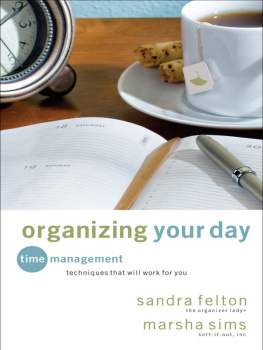
First published in Great Britain in 2006 by
Hodder & Stoughton
An Hachette UK company
Copyright 2006 by Mark Forster
The right of Mark Forster to be identified as the Author of the Work has been asserted by him in accordance with the Copyright, Designs and Patents Act 1988.
All rights reserved. No part of this publication may be reproduced, stored in a retrieval system, or transmitted, in any form or by any means without the prior written permission of the publisher, nor be otherwise circulated in any form of binding or cover other than that in which it is published and without a similar condition being imposed on the subsequent purchaser.
A CIP catalogue record for this title is available from the British Library
ISBN 978 1 444 71843 0
Hodder & Stoughton Ltd
338 Euston Road
London NW1 3BH
www.hodder.co.uk
Get Everything Done and Still Have Time to Play
How To Make Your Dreams Come True
To Lucy
I would like to thank my coaching clients and all the people who have attended my seminars on this subject for the immense amount of feedback they have given me, particularly when theyve asked the difficult questions.
I also want to acknowledge the support, help and ideas I have had from my wife, Lucy, my coach, Rachel Pryor, and my thinking partners, Katie Rowland and Nadjeschda Hebenstreit.
How to get everything done by doing it tomorrow
- Put all the work that you are behind on in backlog folders (email, paper, etc.) and put it where you cant see it.
- Collect all your incoming work during the day and deal with it in one batch the following day. Group together similar activities like email, paper, phone calls and tasks. Aim to clear the lot every day.
- If anything is too urgent to leave to the following day, write it down on a separate list and action it at a convenient time during the day. Never take even the simplest action without writing it down first.
- Spend some time on clearing the contents of the backlog folder(s) first thing every day. When youve finally cleared them, find something else you want to get sorted and start doing that first thing every day instead.
If you follow this simple process you will be totally on top of new work by tomorrow and you will be well on your way to clearing your backlog.
This book will tell you much more about how to do this, but the method essentially consists of these four steps.
To complain about a shortage of time is like a fish in the sea complaining that it has a shortage of water.
This book is about getting you to be 100 per cent creative, ordered and effective.
In my first two books I explored some very different ways of overcoming the problem of how we control our work and our time. In Get Everything Done and Still Have Time to Play I looked at the problems of the traditional methods of time management and then examined some better ways. In How to Make Your Dreams Come True I tried to get away from the whole concept of managing time, and instead looked at how we can get our goals to pull us towards them.
Both my books got a good reception from many people. Nevertheless, inevitably the ideas in them have done little to affect society at large. The problems and pressures of modern life are still there and if anything the pressures we put ourselves under at work have got even worse. Just the other day I received some questions from a journalist who was writing an article about time management. These are very typical of the sort of questions I get asked over and over again.
- I am always rushing. How can I stop?
- I always have to eat fast. How can I slow down?
- I am always having to multitask. How can I focus better?
- I always feel guilty about not spending more time with my family. What can I do about it?
- I never have time to exercise. How can I find the time?
- How can I find the time to take a holiday? Im far too busy.
These are pretty common questions. The journalist was asking them because he believed the public would be interested in the answers, but they were also questions that he needed answering for himself.
These questions all imply that we have a shortage of time. Is this really true? Do we have a shortage of time? No, we dont. Time is the medium in which we exist. To complain about a shortage of time is like a fish in the sea complaining that it has a shortage of water. The next time that you complain that there arent enough hours in the day, imagine for a moment that the day was lengthened to forty-eight hours. Would that enable you to be on top of your work? Not likely! You would almost certainly be just as behind as before.
It struck me as significant that the journalist found it necessary to ask me the questions that he did. They sounded like the inverse of the sort of advice that we give ourselves or our friends and family all the time. In fact his questions could easily be turned into simple rules for living:
- Dont rush.
- Take time to eat properly.
- Focus on one thing at a time.
- Make sufficient time for your family.
- Take adequate exercise.
- Go on regular holidays.
Really all that he and his readers have to do is to decide to keep to these rules, surely?
However, life is never as simple as that. What we decide to do and what we actually do are two different things. If you think of the decisions you have made over the past year, how many of them have been satisfactorily carried to a conclusion or are progressing properly to that end? If you are like most people, you will have acted on some of your decisions, Im sure. But Im also sure that a large proportion will have fallen by the wayside.
So a simple decision such as to take time to eat properly is in fact very difficult to carry out. Our new rule may work for a few days or a few weeks, but it wont be long before the pressures of work force us to make an exception to it. Before many days are up the exception will have become the rule and we are right back where we started. However much we rationalise the reasons why our decision didnt get carried out, we know deep in the heart of us that it was not really the circumstances that were to blame. We secretly acknowledge that there is something missing from our ability to carry out a decision once we have made it.
In fact if we are honest it sometimes feels as if it is easier to get other people to do what we want them to do than it is to get ourselves to do what we want to do. We like to think of ourselves as a sort of separate entity sitting in our body controlling it, but when we look at the way we behave most of the time that is not really the case. The body controls itself most of the time. We have a delusion of control. Thats what it is a delusion.
If we want to see how little control we have over ourselves, all most of us have to do is to look in the mirror. You might like to do that now. Ask yourself as you look at your image:
- Is my health the way I want it to be?
- Is my fitness the way I want it to be?
- Is my weight the way I want it to be?
- Is the way I am dressed the way I want it to be?
I am not asking you here to assess what sort of body you were born with, but what you have made of it and how good a state of repair you are keeping it in.
It may be that you are healthy, fit, slim and well-dressed. In which case have a look round at the state of your office or workplace:


